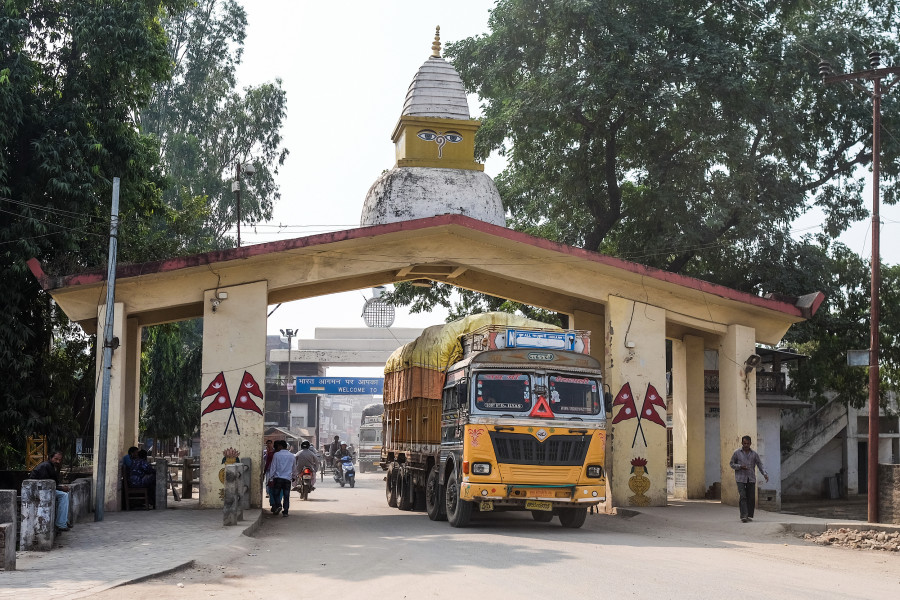Money
India halts all rice exports but Nepal will be fine, say officials
Nepal imports almost all of its fine and basmati rice from India, but traders say there are enough stocks in-country to last three months.
Sangam Prasain & Prithvi Man Shrestha
Last week, Indian rice traders decided to stop signing new export contracts amid the nationwide lockdown instituted by the Narendra Modi government to curb the spread of the coronavirus. Their decision was triggered by labour shortages and logistics disruptions, as all workers have been forced indoors.
On March 25, through the Pradhan Mantri Garib Kalyan Anna Yojana, the Indian government announced distribution of 5 kilos of rice or wheat and a kilo of pulses for the next three months to the poor. This scheme alone covers about two-thirds of the population, or 800 million people.
These two announcements have made clear that India, currently the world's largest exporter of rice, will halt all exports of foodgrains in order to feed its own population.
As India looks inwards, Nepal, which imports much of its rice from its southern neighbour, was expected to face difficulties, but officials say there won’t be any problems. According to Mahadev Prasad Poudel, a senior agriculture scientist at the Department of Agriculture, the halt in exports by Indian traders will not immediately impact the supply chain in Nepal.
The import of rice has been continuing, even though the quantity has decreased, said officials. As of now, Indian traders are still fulfilling past contracts.
“Just last Friday, 121 tonnes of rice and 71.8 tonnes of paddy were imported,” said Dhundi Prasad Niraula, chief customs officer at Birgunj Customs.
According to Subodh Kumar Gupta, president of the Association of Nepalese Rice, Oil and Pulse Industries, the supply of rice in the country will not be immediately affected as there are adequate rice stocks with Nepali mills and the market to last around three months, and farmers too have paddy stocks.
Experts, however, say even a disruption of imports could be an opportunity for Nepal to increase its consumption of locally grown rice and wean itself off imports.
In the first seven months of the current fiscal year alone, the country imported rice worth Rs18 billion, according to statistics from the central bank. In the last fiscal year 2018-19, rice worth Rs32 billion was imported, a significant rise from Rs28.9 billion the previous year.
"The halt in rice exports from India will enable Nepalis to consume their own varieties of rice, often categorised as non-basmati rice," said Bhola Man Singh Basnet, former principal scientist in agronomy at the Nepal Agriculture Research Council.
Along with the rise in the middle class and rapid urbanisation, the demand for fine rice, mainly packaged basmati rice, has increased many fold in Nepal since 2010. As Nepal does not grow fine rice or basmati rice in large volumes, this demand is met through imports from India, which have ballooned.
"But this trend will end. People will have to eat locally produced varieties," said Basnet.
Long-grain basmati rice has a unique charm in global markets, including Nepal, which has resulted in a growth in rice imports, even though the country produced surplus grain, say agro experts.
"Even record paddy output in most years has not dented the import bill because the expanding population of middle income Nepalis prefer basmati rice,” said Poudel.
Nepal imports all of its basmati rice from India.
As per the Ministry of Agricultural Development, one Nepali consumes an average of 191 kg of food every year—90 kg of rice, 45 kg of maize, 45 kg of wheat, and other foods like meat and dairy products.
But labour shortages and logistics disruptions in India will affect scores of rice mills along the southern border. Many rice mills in Bara and Parsa districts do brisk business repackaging rice imported from India and selling it under their own brands.
Balaji Enterprises, a Birgunj-based firm that imports rice from India, has not been able to import the grain from mills based in Uttar Pradesh for the last few days. Bikash Agrawal, manager of the firm, said that they have not been able to import rice from Uttar Pradesh as most mills are closed due to difficulties in transporting and storing rice husks during the nationwide lockdown in India.
According to Agrawal, they are approaching rice mills in Bihar for the rice.
This is not the first time that there has been a halt in the supply in food grains from India. In 2008, when there was a global food crisis, India had imposed a ban on non-basmati rice to many countries, including Nepal. It was only in 2011 that India lifted export restrictions.
"The message is clear: Nepal should be self reliant. If there is a demand for basmati and other fine rice varieties, Nepali farmers should produce them," said Basnet. "This will also help narrow the ballooning trade deficit. "
Nepali farmers gathered 5.55 million tonnes of paddy, the second largest harvest in history, this fiscal year, despite a series of misfortunes including a delayed monsoon, fertiliser shortages, and an armyworm infestation.




 16.12°C Kathmandu
16.12°C Kathmandu















